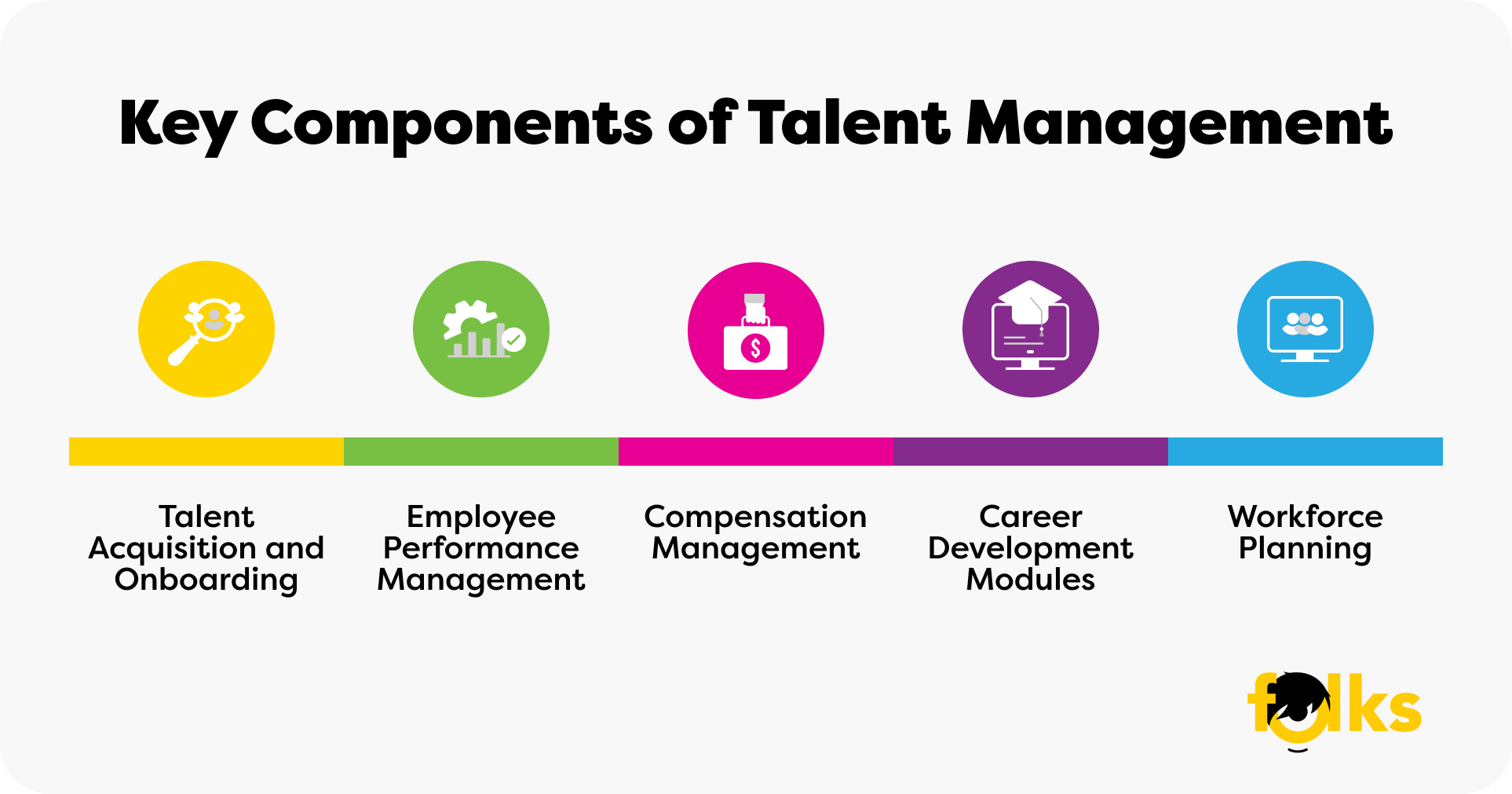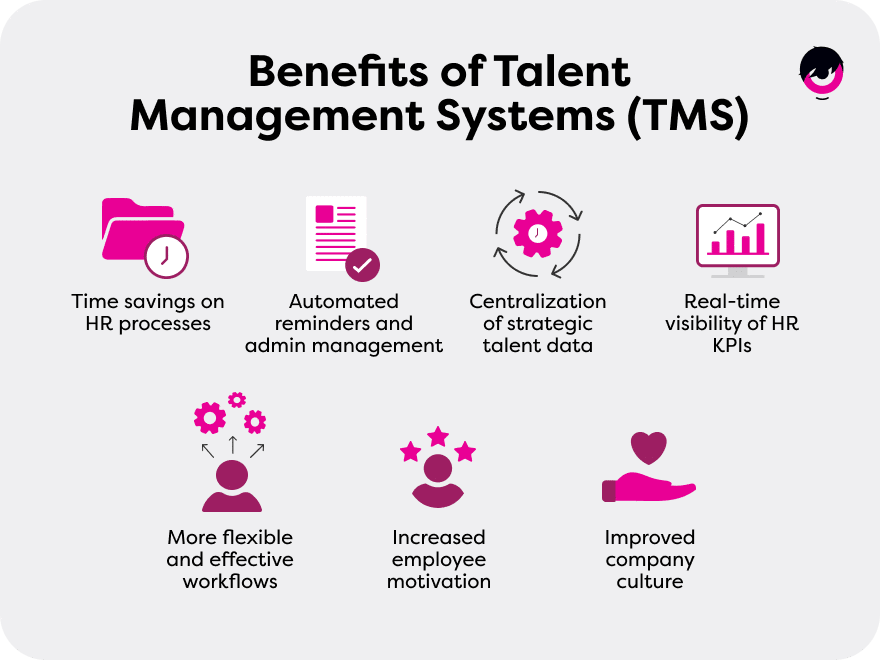While we all know that effective human resource management practices are essential to ensure business success and employee well-being, handling all administrative processes related to the entire employee lifecycle can be daunting.
In a world where workers expect quick and efficient administrative management and improved employee experience, talent management systems have become must-have solutions for HR teams to stay on top of day-to-day processes while ensuring smooth and streamlined workflows. If you have not yet implemented such a system, here is an overview of its key features, the benefits it can bring to your business, and tips for implementing it in your organization.
But first…
What Is Talent Management?
Talent management, sometimes called human capital management, refers to a strategic vision aiming to attract, retain and engage an organization’s workforce in order to ensure business productivity, retention, candidate attraction and succession planning. Talent management practices include numerous HR processes and strategies and are different for every company and organizational context.

What Is a Talent Management System?
Talent management systems are meant to simplify, streamline, and automate talent management processes while monitoring employee engagement and productivity and ensuring the efficiency of HR strategies.
These solutions are often cloud-based and can be referred to as Applicant Tracking Systems, HR software, HRIS (Human Resource Information Systems), or HRMS (Human Resource Management System). While all these platforms have specific features and uses, some essential functionality is a must when choosing a talent management system for your company.
Components of a Talent Management System
Depending on your company’s specific needs and context, you will be looking for different key features to simplify your day-to-day management and improve your productivity. Most talent management tools cover or integrate the following key features:

Talent Acquisition and Onboarding
Recruiting top talent and ensuring they integrate seamlessly into their new team is essential for all organizations.
Some software solutions include recruitment management features such as job postings, automated emails to candidates, and the centralization of your candidate database while integrating with your existing career page or well-known job sites.
Moreover, some modules handle new hire onboarding to ensure that all the administrative tasks and integration steps of your plan are completed efficiently. Did you know that automating onboarding processes can result in 16% higher retention rates? Talent management solutions are great tools to maximize productivity and retain employees from the get-go.
Employee Performance Management
Employee performance is another pillar of talent management, and you need to look for effective performance assessment features when choosing your TMS.
Performance management software helps you track individual progress, streamline appraisal processes throughout the entire department or organization, and align individual and organizational goals. They adapt to the specific performance review needs of your company while encouraging regular check-ins and readjustment of goals when needed. Furthermore, they encourage employee recognition and accountability, which makes all the difference in your day-to-day work environment.
Compensation Management
Compensation and benefits can be challenging to handle administratively. Whether your talent management system includes payroll features to automate compensation management or integrates with another solution to centralize information and simplify processes, you should not overlook this essential component of TMS. For instance, HR software can integrate with payroll to avoid duplicate files and prevent human errors.
Career Development Modules
If you want to retain high-performing employees, you need to give them opportunities to grow with you! That’s where talent management tools come into play: they often provide career pathing and development modules to monitor your teams’ progress and offer growth opportunities when relevant.
Some software solutions automate reminders when certifications need to be renewed and let you track your training budget and hours. They can even include Learning Management Systems (LMS) features to cover the entire development cycle of your employee. In short, talent management solutions are the best way to offer well-deserved learning and development opportunities to your best talent!
Workforce Planning
Workforce planning refers to the analysis of skill gaps, workforce supply and talent management initiatives needed to reach your strategic objectives. It helps you continuously ensure you have the right talent and skills to achieve business goals.
Talent management solutions provide metrics such as Key Performance Indicators (KPIs) and employee data to visualize your teams’ demographics and competency at all times. Data-driven insights will guide your talent management strategies and support your organizational health in the long run.
Benefits of Implementing Talent Management Solutions
Aside from administrative process automation, what are the concrete benefits of implementing talent management solutions? Here are key examples of advantages to understand the importance of these tools for your organization:

Higher Retention Rates
35% of employees resign because they feel their employer doesn’t care about their well-being. Talent management systems are the best way to show your employees that you want to improve their work environment and support their growth, thus reducing the likelihood of them quitting their jobs.
Improved Productivity
Performance management features and strategic workforce planning help you improve individual and organizational productivity by ensuring that goals are aligned and skills are used to their full potential. Moreover, your teams will be more motivated to give their best if they feel their well-being and development are prioritized.
Better Corporate Culture
An efficient talent management system makes your corporate culture shine, not only among your current employees but also among potential candidates. If you are on top of day-to-day processes and effectively evaluate your workforce needs, you will be perceived as a safe and competent company (because that’s exactly what you will be!).
Flexible Processes
Technological solutions such as talent management systems also meet your employee’s expectations of greater flexibility in the workplace. They will be able to better manage their own requests and processes, even remotely. Employers will also be more flexible in the face of day-to-day HR challenges with the proper tools in place.
How to Choose the Right Talent Management System for Your Company
Choosing the best talent management platform for your business reality and needs can be complicated and stressful. Here are the steps you need to follow in your decision-making process:
1. Build a criteria checklist
The first step in any software implementation project is to build a software criteria checklist by order of importance. Prioritize the modules that are the most crucial to you and define how they can support your business strategy and your HR goals in the long run. It is essential to know the gaps and talent management struggles that exist in your organization before you create the checklist to make sure that it covers all your needs.
2. Compare budget and pricing
Before you start looking for talent management systems, you need to define a budget and start comparing it to average pricing. This step represents the best time to make concessions in your checklist and adjust your budget if needed. During your pricing evaluation, remember to write down the talent management solutions that seem to match your needs and budget to save time on future research.
3. Check integration capabilities
Most software solutions do not offer all the features related to talent management – however, they often have integration capabilities that might be interesting for you, especially if you already have other platforms implemented in your organization. For instance, if a talent management tool integrates with your payroll software, you already know that the implementation process will be simplified. You might also discover platforms that are essential to other aspects of your management by checking integration capabilities.
4. Consider your business context
On top of considering your budget, you should also take your business context into account. Some solutions are made for SMBs; others target bigger companies. Some platforms are even developed with specific industries in mind. It might be interesting to take the time to check software providers that know your organizational reality and prioritize it with their features.
5. Request demonstrations and meet providers
Now that you have a list of potential talent management systems you can implement in your company, it is time to request personalized demonstrations and meet the people you might be working with in the future.
During the demonstration, you should evaluate whether the provider understands your needs and meets your criteria. It is also essential to assess if you have a good first impression of the relationship you can build with them and their support team. Think about long-term collaborations, and make sure that you can see yourself working with them in the coming years!
Talent management software systems are here to stay, and you should start thinking about implementing one in your company sooner rather than later. Did you know Folks HR covers the entire employee lifecycle and offers HR functions specifically designed for small businesses? You can get data-driven insights and reduce employee turnover with our comprehensive features! Click here to learn more.
Ready to implement a flexible, effective talent management system in your organization?
Save time and improve employee experience with Folks HR’s numerous features!

